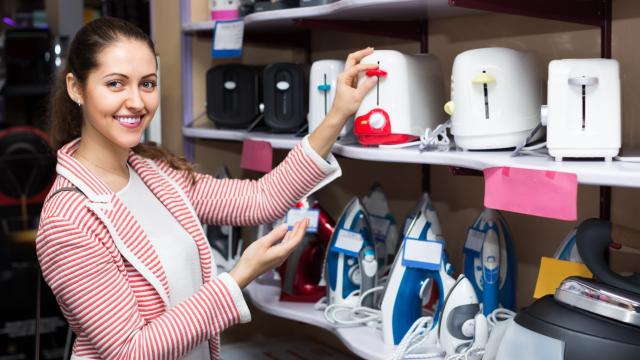Whenever you buy something, you’ve already been on the receiving end of somebody trying to sell it to you. They put in effort to make it look really amazing, and you start thinking about all the ways your life will be better if you have it. You’ll look stylish in that coat. You’ll run all your errands on that bicycle. You’ll be so glad you have an air fryer when you want to air-fry something. But wait! What about those other things you should be considering?
Because the moment when you use the item isn’t the only time you’ll interact with it. How often have we bought a single-use kitchen appliance that’s bulky to store and a pain to clean? Or exercise equipment that becomes a giant hunk of trash when you realise that you don’t actually want to use it, and neither does anybody else? To avoid these types of regrets, ask yourself these three questions before you make the purchase.
Where will I store this thing?
I have to admit I didn’t have a good answer to this one before I bought a kayak. I ended up putting it into the crawl space under the porch, and then animals started nesting in it. Do not recommend. Aside from outdoor equipment like kayaks and bicycles, storage can also be an issue for musical instruments (often large and fragile), kitchen appliances (you can’t store everything on the counter all the time), and even clothes (isn’t your closet already full)?
So before you buy the new thing, think about where it will live. Maybe the solution is as simple as also buying a storage hook — or maybe you’d rather pass on the new purchase after all. If you live in a small space, you may even want to consider what you would need to trash, sell, or give away to make room for the new item.
How will I clean this thing?
Everything requires some kind of maintenance. A new chair might only need an occasional dusting, but a new food processor may have to be taken apart and scrubbed after every use.
So consider: How much work will it take to clean or maintain the new thing? And, more importantly, is it enough trouble that you’ll rarely or never use it? (Dry-clean-only clothing, I’m looking at you.)
What will I do with this thing when I’m done with it?
Everything eventually ends, and while you’re contemplating your own mortality you might as well ponder what’s going to happen to your potential new purchase when it’s no longer new and exciting. “It’s only a few dollars,” is an easy way to rationalize buying something you might not want in the long run, but it’s still on you to get rid of the thing in the end.
Take the flimsy plastic “greenhouse” I bought for my garden one year. It was cheap, so I figured if I got a few weeks’ use out of it in the spring, it was worth the money. But after it blew over in storms a few times, I was left with a broken pile of plastic that was too big to go into the trash can and required a significant amount of work to disassemble. In hindsight: not worth it.
On the other hand, when I was buying an exercise bike, one of the deciding factors was how it might end its life. I was considering a cheap bike that I knew was likely to break after a year or two of heavy use — still a good value for the money, considering. But then what would I do with it? I griped to my husband that I’d buy a better bike, maybe a used Peloton, if they weren’t so expensive. “So Pelotons have good resale value?” he asked. He was right — the robust resale market meant that I would be able to sell a used bike in good condition just as easily as I bought it. Better to pay a little more to save myself the hassle of figuring out how to dispose of a broken bike in two years’ time.
Ultimately, these questions will help you thoroughly think through whether you actually want to own that new thing you’re drooling over, or whether you just want to use it. In the latter case, maybe you’d be happier borrowing or renting the thing, or forgetting about it entirely.

Leave a Reply
You must be logged in to post a comment.